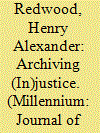|
|
|
Sort Order |
|
|
|
Items / Page
|
|
|
|
|
|
|
| Srl | Item |
| 1 |
ID:
176210


|
|
|
|
|
| Summary/Abstract |
This article explores the role that archives play in the constitution and governance of the international community. First, drawing on post-colonial scholarship, it develops a framework to explicate the link between archive and community, centring on questions of voice, identity and responsibility. It then examines how the archive can be analysed, pointing additionally to the importance of the archive’s materiality. Second, these ideas are explored through a reading of the International Criminal Tribunal for Rwanda’s (ICTR) archive, which helped rebuild the international community in the wake of its failure to prevent the Rwandan genocide. By providing a detailed reading of the ICTR’s records, and drawing on the framework established in the first section, the article shows that the archive constructed a liberal, patriarchal and colonial understanding of the international community.
|
|
|
|
|
|
|
|
|
|
|
|
|
|
|
|
| 2 |
ID:
176209


|
|
|
|
|
| Summary/Abstract |
Why does IR scholarship seem so resistant to travel into other disciplinary spaces? To answer this question, I look at the tendency for scholars within our discipline to talk to the discipline, about the discipline, and for the discipline. We obsess over ‘IR’ and, in doing so, reify IR as a thing. I turn towards Edward Said’s arguments about the worldliness of texts, and how reification shapes how ideas travel. I then provide two illustrations of how scholars have reified IR as a thing: Robert Cox’s approach to critical theory and Amitav Acharya’s call for a ‘Global IR’. In both cases, contrary to expectation, the authors reify IR as a thing, portraying the discipline as distinct from the world. IR is treated as something with agency, ignoring how disciplinary knowledge is produced within worldly institutions. I conclude by looking at three strategies for studying worldly relations in ways that refuse to reify the discipline: showing disloyalty to the discipline, engaging the political economy of higher education, and seeking to decolonise the university. Rather than reifying IR, these strategies help us to engage our scholarly work in a way that prioritises worldly critical engagements within our disciplinary community, and the world.
|
|
|
|
|
|
|
|
|
|
|
|
|
|
|
|
| 3 |
ID:
176211


|
|
|
|
|
| Summary/Abstract |
This article highlights the synergies between securitisation theory and the empirically rich literature on crossborder kin-state policies by underlining the unique dilemmas the logic of security brings to the fore in the transborder setting. Doing so, the article critically engages securitisation theory by focusing on two of its underdeveloped aspects: first, the concept’s relevance for non-liberal settings where securitisation can serve multiple goals other than justifying emergency measures; and second, how securitisation can unfold in a trans-border context and thereby disrupt the Westphalian notion of the unity of state, society and sovereignty. The way Hungary’s illiberal regime exported the securitisation of migration to its kin-minority in Transylvania provides the empirical backdrop for the article. Transylvania is neither a target nor a transit region; nevertheless, the securitising narrative resonated with ethnic Hungarians. To account for this resonance, the article relies on the concept of translation to show how local audiences in Transylvania reconstructed the exported meaning of security to suit their own identity, partly by linking it to their historical experiences – even turning it into banal everyday performances – and partly by seeing it as an opportunity to enact national unity and to demonstrate their loyalty to the securitising actor in Budapest, across the border.
|
|
|
|
|
|
|
|
|
|
|
|
|
|
|
|
|
|
|
|
|